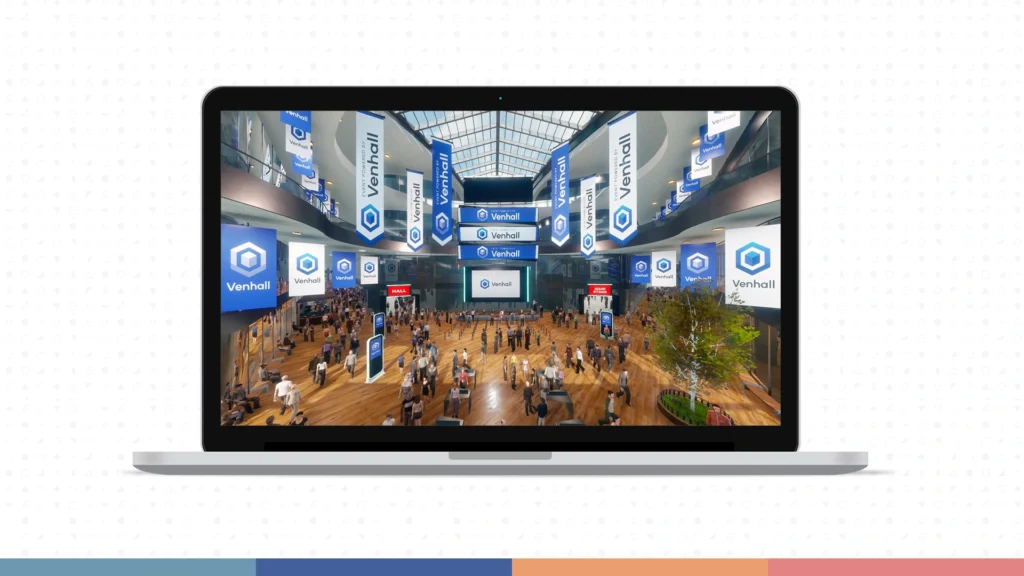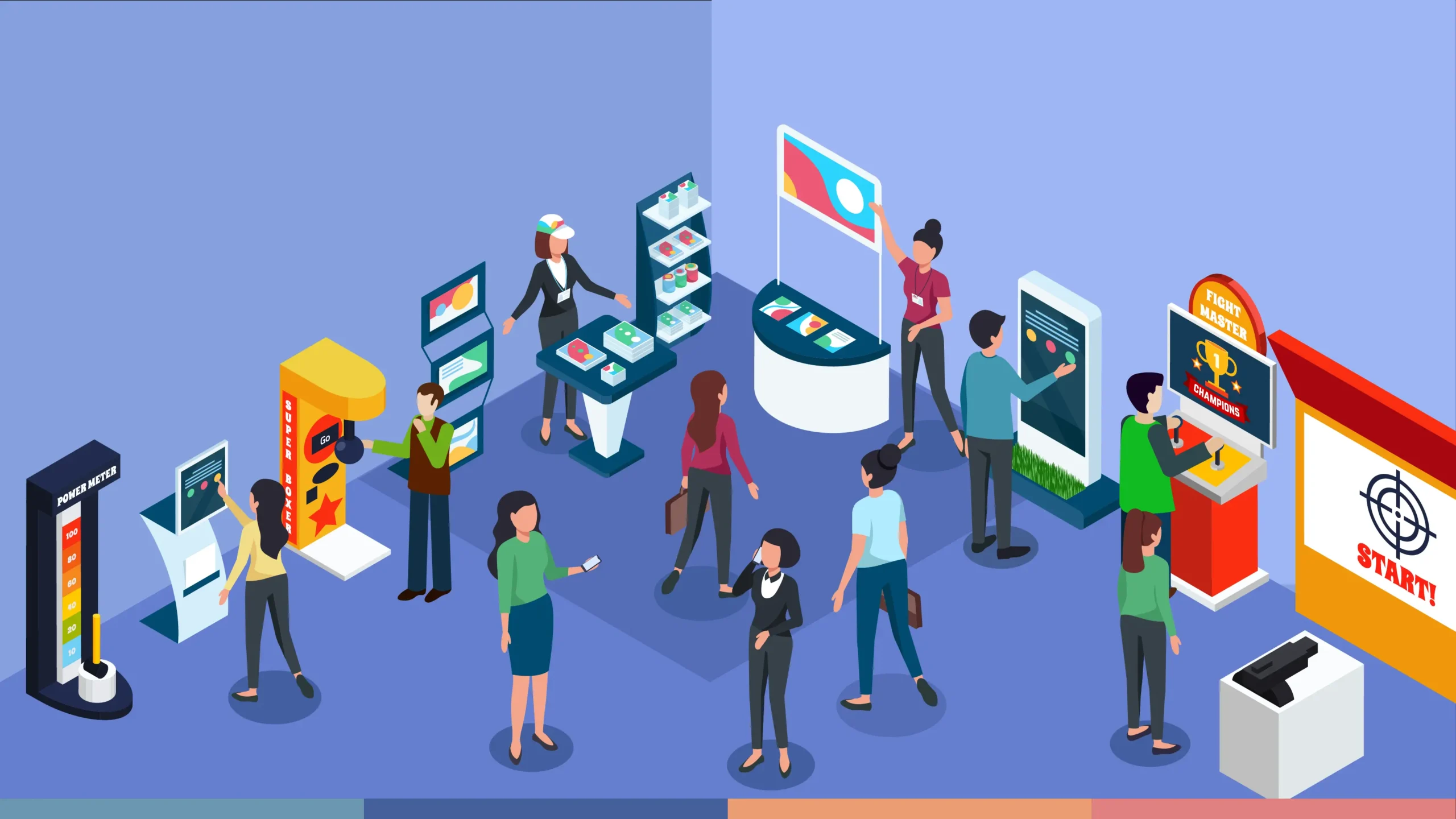How to Boost Your Virtual Events with Gamification

Virtual events are becoming more and more popular and necessary in the post-pandemic world. They offer many advantages over conventional events regarding cost, reach, accessibility, and sustainability. However, they also pose some challenges when it comes to engagement, interaction, and retention. How can you make your events more fun, memorable, and effective? The answer is gamification.
As we bid farewell to traditional in-venue gatherings, it’s essential to explore the myriad benefits that virtual events and gamification bring to the table. This article delves into the advantages of both virtual events and gamification individually and examines how their combination can elevate a company’s event strategy.
The Rise of Virtual Platforms
The traditional way of hosting physical events in brick-and-mortar venues has been disrupted by the emergence of virtual platforms. These platforms offer companies the opportunity to reach a global audience without the geographical limitations of conventional event proceedings. This increased accessibility promotes a larger mass of audience and more diverse participation, breaking barriers and fostering inclusivity.
We have seen evidence of this with the success of Fortnite’s special event music concert by Travis Scott, which gathered audiences from around the world in the comfort of their homes. This shows one of the key advantages of virtual platforms is the ability to transcend geographical boundaries, allowing attendees to participate from anywhere, eliminating travel expenses and time-consuming commutes. This not only expands the reach of the event but also ensures a more diverse and inclusive audience can partake in the experience.
Hosting events in physical venues can incur substantial costs for venue rental and logistics. Virtual events significantly reduce these expenses, making them a more cost-effective option for companies. The saved resources can be redirected towards enhancing the overall event experience or invested in other strategic initiatives.
Data Analytics and Insights
Virtual events provide a wealth of data and analytics that can be invaluable for companies. From attendee engagement metrics to content performance analytics, organizers can gain insights into participant behavior and preferences. This data-driven approach allows for more informed decision-making and the refinement of future events based on real-time feedback.
The Power of Gamification
Gamification has been proven to be a powerful tool to enhance engagement and motivate people. However, its application in virtual events is not very common, despite limited evidence. When gamification is implemented in virtual events, it introduces an element of amusement and competition, turning the attendee experience into an interactive and immersive journey. Using game development expertise such as Level Up Powered by Agate, they have shed light on the effectiveness of virtual events compared to conventional events, by adding gamification to virtual events. Their successful work such as Venhall in creating a virtual event demonstrates that gamification can significantly enhance the experience of virtual events when used effectively.
Enhanced Engagement and Participation
Gamification injects a sense of playfulness into virtual events, making them more engaging and enjoyable for participants. Whether through quizzes, challenges, or virtual scavenger hunts, gamified elements captivate the audience’s attention, fostering active participation and sustained interest throughout the event.
Community Building and Networking
Virtual events often struggle to replicate the organic networking opportunities that in-person gatherings offer. Gamification addresses this challenge by providing structured activities that encourage interaction and networking. From leaderboards showcasing top performers to team-based challenges, gamification strengthens the sense of community among participants.
Learning and Skill Development
Incorporating game-like mechanics into virtual events can facilitate effective learning experiences. Whether through simulations, case studies, or role-playing scenarios, gamification promotes skill development in a dynamic and engaging way. Attendees are more likely to retain information and apply learned skills when the educational component is presented in a gamified format.
The Synergy of Virtual Events and Gamification
By combining virtual events with gamification, companies can unlock a synergistic effect that transcends the benefits of each individually. This powerful duo creates an immersive and memorable experience that resonates with participants long after the event concludes.
Increased Interaction and Social Connectivity
Virtual events, when infused with gamified elements, become social hubs where participants actively engage with content and each other. From friendly competition to collaborative challenges, gamification fosters a sense of camaraderie and shared experience, mitigating the isolation that can sometimes accompany virtual events.
Brand Differentiation and Memorable Experiences
In a crowded digital landscape, companies strive to differentiate themselves and leave a lasting impression. Virtual events with gamification offer a unique and memorable experience that sets them apart. Attendees are more likely to remember and associate positive emotions with brands that provide entertaining and interactive events.
Measurable ROI and Continuous Improvement
The combination of virtual events and gamification allows for precise measurement of return on investment (ROI). Organizers can track engagement metrics, participant feedback, and overall event success. This data-driven approach enables continuous improvement, with organizers refining future events based on insights gained from the gamified virtual experiences. From the time spent by participants, the number of sessions attended, to the level of engagement in gamified activities – all these data points contribute to a comprehensive understanding of the event’s impact. This data-driven approach not only quantifies the success of the event but also provides valuable insights for future improvements and strategies. It’s a win-win situation for both the organizers and the participants. The organizers get their desired ROI and the participants get an engaging and personalized experience.
Understanding the concept of virtual event gamification is crucial, but creating creative ideas to implement it can be a significant hurdle for organizers. To assist you in developing your gamified virtual events, here are some innovative gamification suggestions to help you get started.
Create Custom Games
Designing custom games tailored to your event’s theme adds a personalized touch. Quizzes, team-building exercises, or virtual treasure hunts aligned with your products or services engage attendees effectively. Consider incorporating elements like the phonetic alphabet in quizzes for a unique twist. Adding sponsored prizes can enhance engagement and enthusiasm.
Break the Ice with Games
Initiate your event with an ice-breaking game to foster a comfortable and enjoyable atmosphere. This can be done individually or in teams, encouraging collaboration. For instance, a game where participants share their funniest workplace stories and rate each other’s stories can infuse humor into the event, setting a positive tone.
Recognize Achievements
Implement leaderboards or acknowledge individual achievements to tap into the human desire for recognition. Real-time updates on leaders and notable accomplishments keep participants invested in the event. Utilize event platforms or software for real-time notifications or resort to email updates to maintain engagement.
Utilize Digital Cards
The flexibility of virtual events allows for the incorporation of collectible cards into your gamification strategy. For example, award cards for attending sessions or participating in quizzes related to your event’s content. Encourage networking by enabling participants to swap duplicate cards with others, fostering connections.
Incorporate Sponsorship
Leverage virtual events for sponsorship opportunities, extending beyond simple brand awareness. Incorporate sponsors into the gamification process by awarding points for attending sponsor sessions or visiting virtual booths. This not only benefits sponsors but adds depth to your event’s gamified experience.
Team-Based Engagement
Combat the challenge of limited networking in virtual events by assigning attendees to teams. Award points for various activities, from event attendance to participation in quizzes and sessions. This approach promotes both individual attendance and collaborative efforts within teams, enhancing overall engagement.
Passports for Exploration
For larger events with multiple exhibitors, introduce virtual passports for attendees. Each visit to an exhibitor or session earns virtual stamps, with points awarded for each interaction. Incentivize participation with prizes for top scorers while ensuring concrete engagement for stamp validation.
Trivia Quizzes for Active Participation
Encourage active engagement through trivia quizzes related to your event’s content. These quizzes not only serve as icebreakers but also provide valuable feedback on participants’ attentiveness. Offer prizes for individual quizzes or cumulative scores, fostering a competitive yet enjoyable atmosphere.
Conclusion: Elevating Engagement with Gamification
In the realm of virtual events, gamification has emerged as a key tool for enhancing engagement. As we transition from traditional in-person gatherings, the blend of virtual events and gamification offers an interactive experience for participants, bridging geographical gaps and nurturing a sense of community. Level Up powered by Agate, is leading this transformation with a robust team that can help you boost employee engagement, motivation, learning, and productivity. Our success stories reflect our dedication to assisting businesses in achieving their goals through gamification. If you’re curious about how to make your virtual events more engaging, we invite you to explore Level Up’s gamification portfolio page. For tailored advice and a complimentary consultation, don’t hesitate to contact us. Experience the potential of Level Up Powered by Agate’s gamification services in meeting your organization’s unique needs.
If you are interested in learning more about gamification and how it can benefit you or your organization
Check out our gamification services page and contact us today. We are ready to help you create a gamification experience that aligns with your needs and preferences.
Article Authors

Junialdi Dwijaputra

Dias Setyanto
Related Articles
- All Posts
- All
- All-EN









